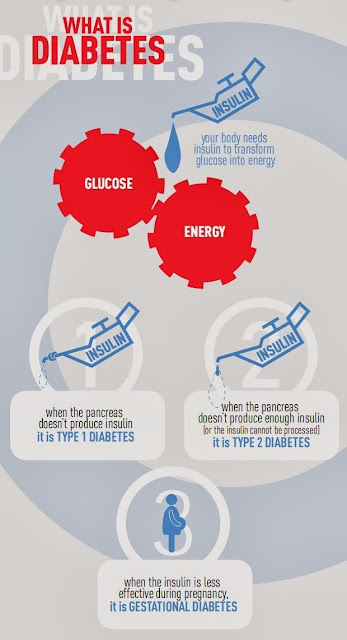More than 9 million Canadians are living with diabetes or prediabetes.
There are three main types of diabetes:
Type 1 diabetes, usually diagnosed in children and adolescents, occurs when the pancreas is unable to produce insulin. Insulin is a hormone that controls the amount of glucose in the blood. Approximately 10 per cent of people with diabetes have type 1 diabetes.
The remaining 90 per cent have
type 2 diabetes, which occurs when the pancreas does not produce enough insulin or when the body does not effectively use the insulin that is produced. Type 2 diabetes usually develops in adulthood, although increasing numbers of children in high-risk populations are being diagnosed.
A third type of diabetes,
gestational diabetes, is a temporary condition that occurs during pregnancy. It affects approximately 2 to 4 per cent of all pregnancies (in the non-Aboriginal population) and involves an increased risk of developing diabetes for both mother and child.
Prediabetes refers to a condition where a person’s blood glucose levels are higher than normal, but not yet high enough to be diagnosed as type 2 diabetes.
If left untreated or improperly managed, diabetes can result in a variety of complications, including:
- Heart disease
- Kidney disease
- Eye disease
- Problems with erection (impotence)
- Nerve damage
The first step in preventing or delaying the onset of these complications is recognizing the risk factors, as well as signs and symptoms of diabetes.
What are the risk factors for diabetes?
If you are aged 40 or older, you are at risk for type 2 diabetes and should be tested at least every three years. If any of the following risks factors apply, you should be tested earlier and/or more often.
Being:
- A member of a high-risk group (Aboriginal, Hispanic, Asian, South Asian or African descent);
- Overweight (especially if you carry most of your weight around your middle).
Having:
- A parent, brother or sister with diabetes;
- Health complications that are associated with diabetes;
- Given birth to a baby that weighed more than 4 kg (9 lb);
- Had gestational diabetes (diabetes during pregnancy);
- Impaired glucose tolerance or impaired fasting glucose;
- High blood pressure;
- High cholesterol or other fats in the blood;
- Been diagnosed with polycystic ovary syndrome, acanthosis nigricans (darkened patches of skin), or schizophrenia.
What are the symptoms?
Signs and symptoms of diabetes include the following:
- Unusual thirst;
- Frequent urination;
- Weight change (gain or loss);
- Extreme fatigue or lack of energy;
- Blurred vision;
- Frequent or recurring infections;
- Cuts and bruises that are slow to heal;
- Tingling or numbness in the hands or feet;
- Trouble getting or maintaining an erection.
It is important to recognize, however, that many people who have type 2 diabetes may display no symptoms.
Can you prevent diabetes?
Scientists believe that lifestyle changes can help prevent or delay the onset of type 2 diabetes. A healthy meal plan, weight control and physical activity are important prevention steps.
How is diabetes treated?
People with diabetes can expect to live active, independent and vital lives if they make a lifelong commitment to careful diabetes management, which includes the following:
Education: Diabetes education is an important first step. All people with diabetes need to be informed about their condition.
Physical Activity: Regular physical activity helps your body lower blood glucose levels, promotes weight loss, reduces stress and enhances overall fitness.
Nutrition: What, when and how much you eat all play an important role in regulating blood glucose levels.
Weight Management: Maintaining a healthy weight is especially important in the management of type 2 diabetes.
Medication: Type 1 diabetes is always treated with insulin. Type 2 diabetes is managed through physical activity and meal planning and may require medications and/or insulin to assist your body in controlling blood glucose more effectively.
Lifestyle Management: Learning to reduce stress levels in day-to-day life can help people with diabetes better manage their disease.
Blood Pressure: High blood pressure can lead to eye disease, heart disease, stroke and kidney disease, so people with diabetes should try to maintain a blood pressure level at or below 130/80. To do this, you may need to change your eating and physical activity habits and/or take medication.
For more information, please visit the
Canadian Diabetes Association webpage.
The
Leduc Beaumont Devon Primary Care Network has a team of healthcare professionals that help people living with various chronic conditions such as diabetes, pre-diabetes, high blood pressure, high cholesterol and obesity. A smoking cessation program is also offered. Our team, which includes a registered nurse, psychologist and pharmacist, registered dietitians and an exercise specialist, works with patients to help them learn strategies to improve their ability to manage their health.
If you are concerned with any of these health issues, please see your
LBD PCN family physician for a referral to our program.
 S Sally Ho is a Registered Dietitian and Certified Diabetes Educator with the Leduc Beaumont Devon Primary Care Network.
S Sally Ho is a Registered Dietitian and Certified Diabetes Educator with the Leduc Beaumont Devon Primary Care Network. 




